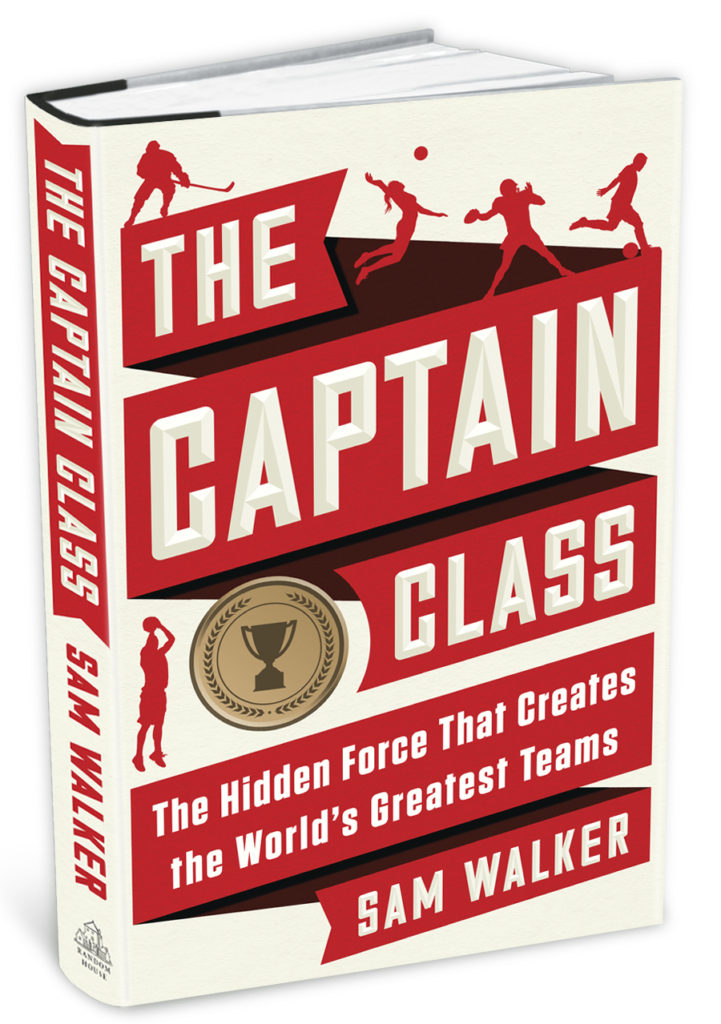
Sam Walker, is the author of the newly released book The Captain Class from Penguin Random House (in the US) and Ebury Press (in the UK), and he granted me the opportunity to ask him some questions about the process of writing the book and thoughts about the book ranging from Tom Brady to Didier Deschamps, and which teams today could join the elite level of team sports.
The book is an amazing piece of research and journalism, that is both fascinating and eye-opening to how team sports work and why the best gain the greater results.
The book is an amazing piece of research and journalism, that is both fascinating and eye-opening to how team sports work and why the best gain the greater results.
How long did the whole book take to write?
Funny you should ask that. When I decided to try to figure out
what makes great teams great, I knew I first had to come up with an objective
sample of the greatest teams in sports history to study. I set a side a couple
of weeks to do that. Let’s just say it turned out to be a little more
complicated... Like 11 years more complicated!
What was your favourite part of the process; the
researching or the plotting?
I don’t want to bang on about how much time it took me to write
this book. The truth is that it was completely engrossing and fascinating. The
most fun was trying to put all the pieces together. The more evidence I found that
captains were the secret ingredients of elite sports dynasties, the more
obsessed I became with solving the puzzle of why.

How much fun did you have looking into the
history of team sports?
The research was a slog at times. Try finding reliable match
records for Brazilian domestic football! I also had to comb the world for
out-of-print books then line up translators to read them for me. I think I used
nine translators in all, from Russian and Japanese to Spanish and Hungarian.
But you’re right: I had a blast. I’d been covering sports for 20 years and was
shocked by how much I didn’t know. And every time I found an elite team, I
would find a captain who fit the mold. That never got old. And then there were
the interviews: Carles Puyol, Carlos Alberto Torres, Pele, Didier Deschamps,
Phillipp Lahm, etc. Those were incredible.
What is your favourite sport and teams for the
major US sports?
I know that people in the UK don’t get it, but I grew up in Ann
Arbor, Michigan, which is the home of the University of Michigan (my alma mater).
So my favorite teams are that school’s teams, with college (American) football
being my greatest passion. It was hard to cut college sports from my study, but
I had to face facts. The level of play in college football isn’t higher than
the NFL. So I really did come to this without any tribal biases. (Of course,
Tom Brady of the New England Patriots went to Michigan, which made leaving him
out of the final list kind of excruciating).
| One more ring and Brady joins Walker's elite |
Was it hard to stick to your methodology when
trying to keep Michael Jordan out of the Tier One teams?
Yes and no. Obviously, people love to read about the Bulls, so if
I simply wanted to sell books, I probably should have found a way to include
them. But I felt that I had to be objective, and to stick to my criteria no
matter what. In the end, the Bulls weren’t the toughest cut. They didn’t win
the most championships, and they didn’t achieve the longest streak of sustained
success, either. Also (I devoted a chapter to this) Michael Jordan did not fit
the profile of an elite captain. In fact, the team didn’t achieve its full
potential until another player, Bill Cartwright, became the co-captain in 1991.
So I was able to write a lot about that team in the book, anyhow.
In my review, I spoke about the absence of
cricket. I felt as a sport it is more dependent on captain input than others,
yet you omitted any cricket side including the great West Indies side(s) of the
1970s/80s. Can you explain?
The toughest teams to cut were the current
New England Patriots and the three best cricket sides in history. You’re right
about West Indies. They were amazing, and Clive Lloyd is a model of the captain
type I’ve identified. The trouble is that the Windies’ records, in both test
and ODI, were mostly matched or exceeded by the later Australian sides led by
Ricky Ponting and Steve Waugh. But while Waugh’s team was a test machine, it
was uneven in ODI. Ponting had the reverse problem. So in the end, I just
couldn’t say that any one of these teams was uniquely outstanding.
Is there a team that is currently knocking on the
door of Tier One, say the Golden State Warriors, or a more obscure sports team
at the moment?
The Warriors are probably the best bet. I don’t think most people
realize that the team’s leader (and co-captain) is Andre Igoudala, a classic
water-carrier who doesn’t care about individual accolades. If the Patriots win
another Super Bowl, they’re in. Another team that’s on the cusp is the U.S.
Women’s water polo team, which is probably arguably already the best in that
sport’s history.
| Is Curry and the Warriors joining the Tier One? |
What is your take on the NBA, it is driven by
player power than tactical systems, hence the end of Phil Jackson's Triangle in
New York?
I think there’s a misguided notion that because NBA teams are so
small, with only five players, that the best strategy is to have one or two
superstars who can put the teams on their backs and win games almost
singlehandedly. But the Celtics and the Spurs, the two best NBA teams, were
great because of the way the players played without
the ball. Even on a small team, you need people setting picks, hustling
back on defense, diving for loose balls, rebounding and blocking shots. All of
that stuff, added up, is more important than scoring. And superstar scorers
tend to be lousy at those things.
Do you feel your book can be read by business
leaders who can learn from sportsmen, and vice versa?
I’ve gotten tremendous feedback from people
in the business world, so yes—I think so. A lot of businesses, like sports
teams, are doing away with this kind of leadership structure. These captains were
basically middle managers, intermediaries between the manager and the other
players. A lot of teams and businesses are trying to get rid of middle managers
so the stars and managers can communicate without any interference. I just don’t
think that works in the long run. In the book, I’ve also used a ton of research
done on business teams to show why the unusual methods these captains used were
so effective. In the end, I think teams are teams. So these lessons can be
universal.
Based on your book, where does the Ryder Cup
stand as you have a Captain albeit non-playing leading a team of 12 individuals
yet the good captains get lauded more than the team say Paul Azinger, Sam
Torrance and Tony Jacklin?
I think the Ryder Cup is an anomaly. Golf is not a “team” sport in
the fullest sense, because the athletes don’t interact with their teammates on
the course, and they don’t have to defend against opponents directly. And
because the captain is really more of a coach, it’s hard to compare it to
anything else. I do think captains make a difference in the Ryder Cup, though,
mainly because golfers are used to playing for themselves. It takes a certain
kind of personality to get them to gel into a collective.
| Paul Azinger is he Captain Class? |
What has the response been to the book in
America thus far?
Really overwhelmingly great and humbling,
thanks for asking! I’ve had excerpts run in The Wall Street Journal, ESPN,
Sports Illustrated, Fast Company, and the sports site Deadspin, and the
feedback has been tremendous. Both Amazon and Apple iBooks chose it as one of
the best books of the month and I’ve had great early reviews and mentions in
the Washington Post, Time, Kirkus and Publisher’s Weekly. Best of all is the
social media traffic. People have said some really flattering things, which I
won’t repeat for fear of sounding like a braggart. I’ve also heard from a bunch of sports team
executives and Olympic team officials who’ve asked me to come to speak to their
groups. They’re a tough crowd, so I’m thrilled they’re connecting with the
material.
What are you working on next?
I wish I had an answer for that! There are so
many angles I’ve found during this project that I would love to follow up on.
I’ve decided to wait and see which things people seem most curious about before
picking one. Right now, frankly, I’m just looking forward to a beach chair, a
margarita, and a really long nap.
The Captain Class is released from Ebury Publishing on 18th May in all formats.
No comments:
Post a Comment